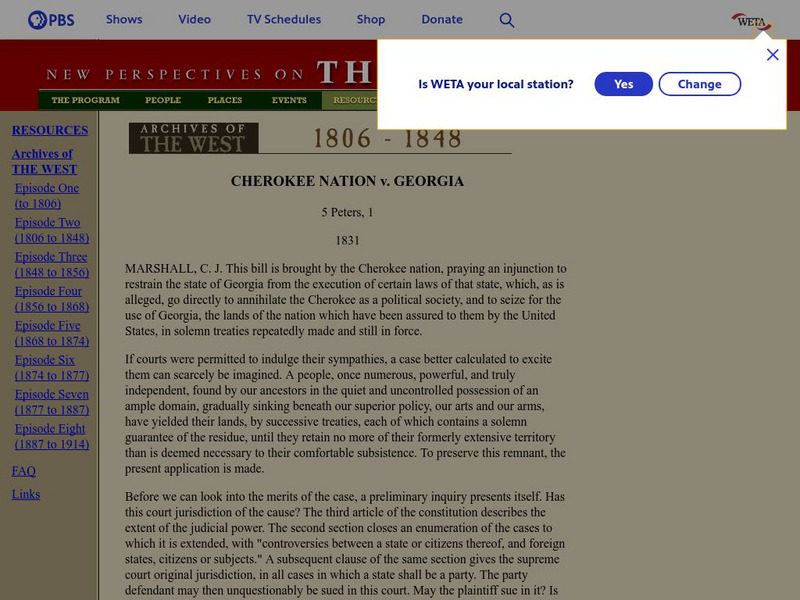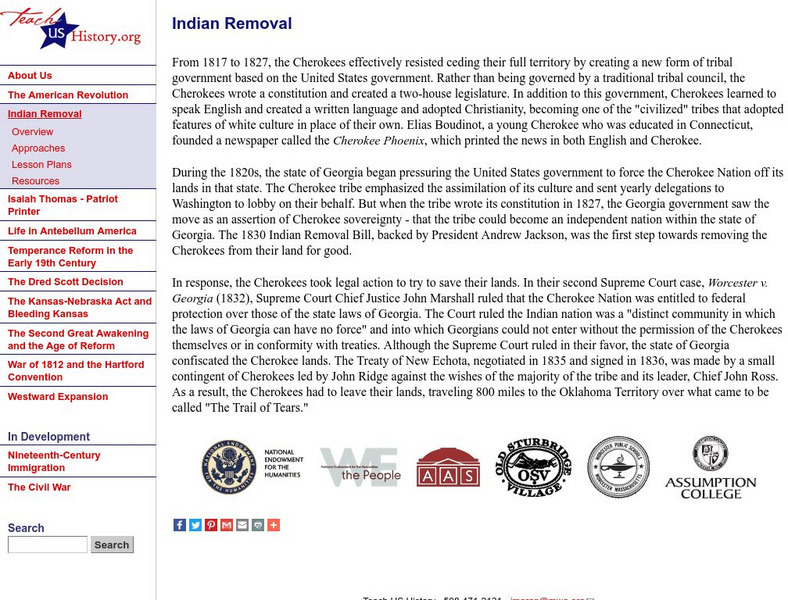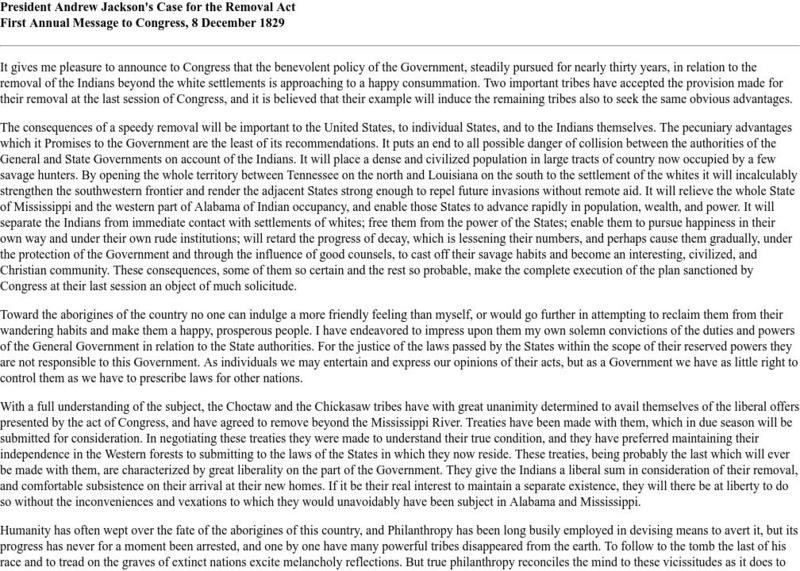Hi, what do you want to do?
K20 LEARN
Worcester v. Georgia: Cherokee Sovereignty and Actions of the U.S. Government
Young historians study the Supreme Court case "Worcester v. Georgia" and note instances where the Justices defended the sovereign rights of the Cherokee. They also examine the actions of President Andrew Jackson and the...
Smithsonian Institution
Native Resistance: Native Resistance Then and Now
Native Americans lost so much—and gained so little in return. Scholars explore Native Americans' resistance to the United States government. The lesson uses primary sources to explore the different forms of protest and gives a voice to...
Smithsonian Institution
Borders within the United States: Indian Boarding Schools and Assimilation
Native American Nations ... sovereign entities or removable tribes? A thought-provoking instructional activity explores the relationship between Native American tribes and the United States, including forced assimilation and removal from...
Race Briges Studio
I am Indopino: Or, How to Answer the Question, "Who Are You?"
In our increasingly multi-ethnic society, many students find it difficult to identify themselves as belonging to any one ethnicity. Gene Tagaban, a Tlingit, Cherokee, Filipino offers his personal experiences with these questions in his...
Smithsonian Institution
Eastern Indian Wars
Many know that Native Americans were forced off their lands and moved west, but how did these people react? The Red Sticks faction of the Creek nation opted to defend themselves and their lands in a series of wars called the Eastern...
Alabama Department of Archives and History
Jacksonian Democracy and Indian Removal
Introduce a study of the presidency of Andrew Jackson with a lesson that uses video clips, primary source documents, group activities, and debates to examine Jackson's early life and career. The lesson focuses on the 1828 election and...
Curated OER
Come West Young Man
Students interpret the maps associated with the early development of the Oklahoma Country. They describe reasons for moving to Oklahoma Country in a letter to a relative.
Curated OER
Trail of Tears
Students discover that the Indian Territory was comprised of many Indian tribes originating from many different locations. They distinguish between the Indian tribes in the Indian Territory.
Curated OER
The Changing Faces of Oklahoma
Students create a historical atlas depicting the changes leading up to 1890 and those afterwards in the Indian Territory/Oklahoma region. line.
Curated OER
How the West was Lost-The Trail of Tears
In this Native American history worksheet, students respond to 14 short answer questions about Cherokee removal polices and the Trail of Tears.
Curated OER
Lesson Plan: The Math of Removal
Students consider the plight of those who walked the Trial of Tears. In this Indian Removal lesson, students compare statistics regarding Indian survival rates.
Curated OER
President Jackson, the Cherokee and Indian Removal
Students interpret historical evidence presented in primary and secondary resources. In this Indian Removal Act lesson, students examine the act and discuss the implications of moving the Cherokee. Students...
Curated OER
Events Leading to the Indian Removal 1830-1832
High schoolers consider the effects of Indian Removal on the Cherokee Nation. In this American history lesson, students research Internet and print sources regarding the Indian Removal Act of 1830. High schoolers write short stories that...
Curated OER
Indian Removal: The Cherokees, Jackson, and the “Trail of Tears”
Students examine executive power. In this Indian Removal lesson, students listen to their instructor present a lecture regarding the "Trail of Tears". Students respond to discussion questions regarding the lecture.
Curated OER
Debating for Land
Students research pertinent information based on historical facts and is supported by quotations from primary sources in order to prepare for a class debate about land ownership in the 19th century.
Curated OER
Lesson One: The Three Perspectives on Native American Removal
Eleventh graders explore the impact of the Indian Removal Act. In this US History lesson plan, 11th graders analyze primary resources.
Curated OER
Township and Range in the Wild West
Students explore how the township and range system is designed and read. They create real estate advertisements utilizing maps and the township and range system.
Smithsonian Institution
National Museum of American History: The Price of Freedom: Americans at War
View comprehensive sets of artifacts that tell the story of America's wartime past and present. Artifacts from every major American military conflict, beginning with the American Revolution, can be closely examined. Full curatorial notes...
PBS
Pbs the West: Cherokee Nation v. Georgia
The critically acclaimed PBS series, "The West," presents a copy of the order given by Chief Justice John Marshall when the bill to seize the Cherokee lands came to court.
US National Archives
Our Documents:president Jackson's Message to Congress 'On Indian Removal' (1830)
On December 6, 1830, President Jackson spoke to Congress about his position on relocating Indians in order to make way for settlers in the west. This paved the way for government policy in dealing with native peoples even after his...
Other
Collector's Guide: Indian Territory: Phoenix Rising From the Trail of Tears
A discussion of the art forms preserved by the Native Americans who were resettled by the U.S. government in the Indian Territory.
Other
Teach Us History: Indian Removal
A lesson unit that looks at the efforts of the Cherokee Nation in Georgia between 1817 and 1827 to establish their own system of governance and to keep their lands from being ceded. Even though the Supreme Court ultimately ruled in their...
Constitutional Rights Foundation
Constitutional Rights Foundation: Indian Removal: The Cherokees, Jackson, and the "Trail of Tears"
Collaborative and consensus building activity on U.S. policy and treatment of Native Americans. Lesson provides an in-depth look at government Indian removal and provides a list from which students choose and defend a Native American...
Mount Holyoke College
International Relations: Andrew Jackson's Case for the Removal of Indians
Here, read the text to President Jackson's "First Annual Message to Congress, 8 December 1830," in which Jackson argues for the removal of Native Americans.




























